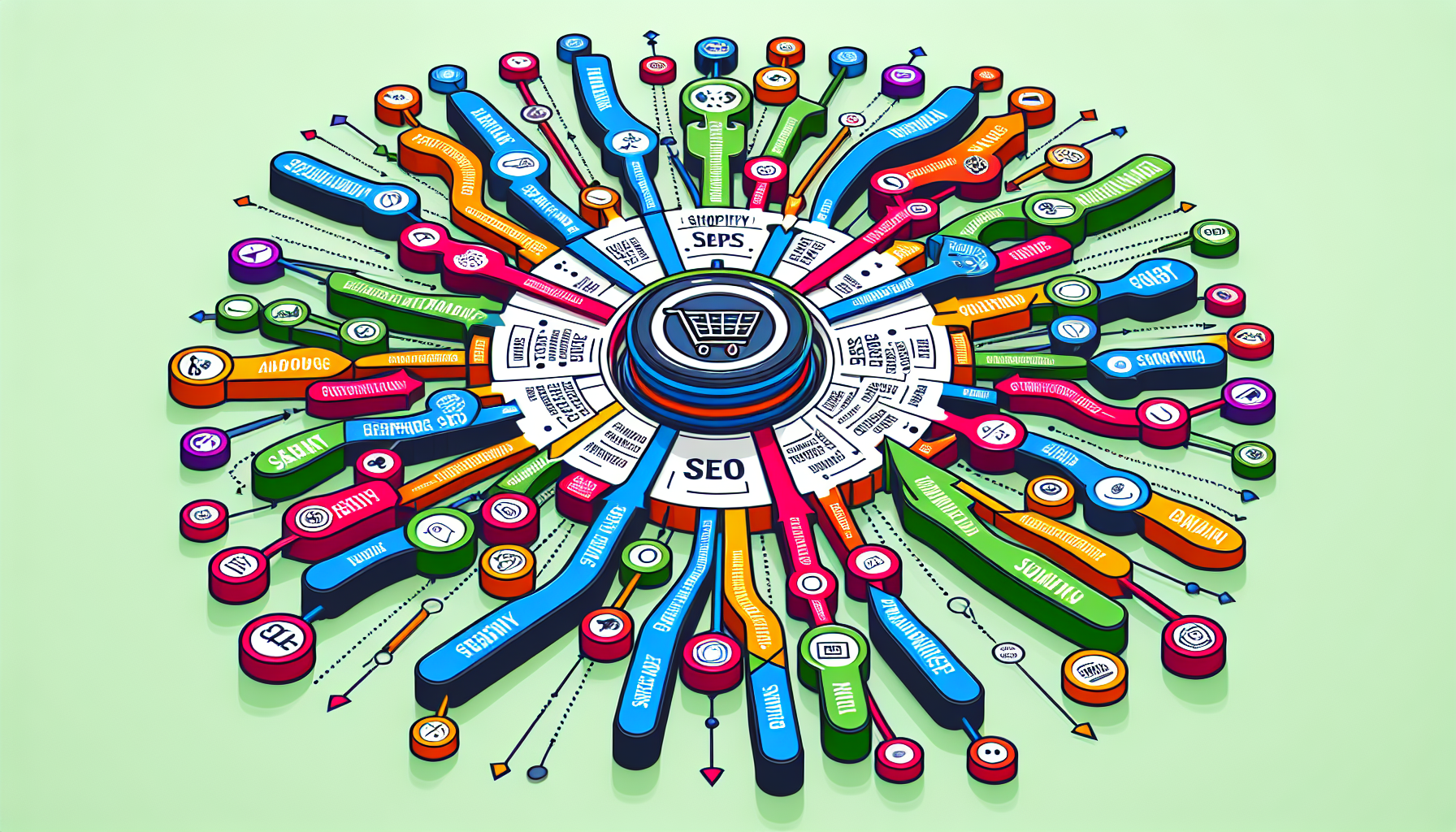Top Tips for Optimizing Your Shopify Keywords for Better SEO
Optimize your Shopify keywords with these top tips to boost SEO and drive more traffic.



Alex Voichenko
Content Manager

Looking to boost sales on your Shopify store?
Try our SEO tools for free and see how they can help you improve search rankings and drive more traffic to increase your sales.
Get startedLooking to improve your Shopify store’s SEO? Discover how effective Shopify keywords can drive more organic traffic and improve your search engine rankings. This article will guide you on selecting the best keywords and integrating them into your store content.
Key Takeaways
Keywords are essential for improving visibility and driving organic traffic to your Shopify store, aligning your content with user search queries.
Conducting thorough keyword research, including analyzing competitors, identifies high-traffic opportunities and helps tailor your SEO strategy effectively.
Regularly updating keywords and content, along with optimizing product titles, descriptions, and blog posts, is crucial for maintaining strong SEO performance.
Understanding the Role of Keywords in Shopify SEO

Keywords are the cornerstone of search engine optimization. These are the words or phrases people use in search engines. They help users find products or information. For Shopify stores, using relevant keywords in your content is essential to drive organic traffic and improve search engine rankings. Incorporating the right keywords makes it easier for potential customers to find your store and products.
Search engines use these keywords to index and rank your store in search results. Thorough keyword research ensures your Shopify store attracts the right audience and meets their search queries. This process is fundamental to improving visibility and ranking higher in search engine listings.
Why Keywords Matter for Your Shopify Store
Keywords are vital for identifying your Shopify store as a legitimate website to search engines. They increase your store’s visibility to both search engines and users, making it easier for potential customers to find you. Keywords align your content with user search queries, helping to attract a targeted audience who are specifically looking for your products.
Effective keyword research not only enhances visibility and drives more organic traffic but also increases sales by connecting with customers who have a specific intent. Scraping competitor sites for high-traffic keywords can reveal gaps and opportunities in your strategy.
Ultimately, tailored keyword strategies are crucial for targeting niche markets and improving overall SEO performance with the target keyword.
How Search Engines Use Keywords
Search engines rely on specific keywords to index and understand your Shopify store’s content. This process is critical for determining how your store appears in search results. Using relevant keywords helps search engines understand the context of your content, making it easier for them to match your store with the right audience.
The proper use of keywords not only improves search engine optimization but also enhances the user experience. When search engines accurately index your content, it appears in relevant search queries, driving more targeted traffic to your store. Avoiding keyword stuffing and focusing on natural keyword integration is essential for maintaining readability and SEO effectiveness.
Conducting Effective Keyword Research

Conducting effective keyword research is crucial for enhancing visibility and attracting organic traffic to your Shopify store. Keywords act as signals to AI algorithms, helping search engines interpret your store’s content and index it correctly. Utilizing multiple relevant keywords provides a clearer picture of your store’s offerings to search engines, enhancing your overall SEO performance.
Keyword research tools and insights are vital for refining your keyword strategy and optimizing your content. These tools help identify the keywords potential customers are searching for, including regional terminology differences, and assist in finding high-volume keywords with lower competition.
Identifying Your Target Audience
Understanding your target audience’s search behavior is crucial for tailoring keyword strategies effectively. Aligning your content with user search queries makes it easier for potential customers to find your Shopify store. Tools like Google Analytics can track user interactions and provide valuable insights into site performance, helping you refine your keyword strategy and content.
Knowing your audience’s search intent helps in selecting target keywords that resonate with their needs and interests. This alignment not only improves visibility but also enhances the overall user experience, leading to higher engagement and conversion rates.
Using Keyword Research Tools
Popular tools for keyword research, such as Google Keyword Planner and ConvertMate, offer functionalities that assist in finding relevant keywords. These tools help identify high-volume keywords and suggest keyword ideas based on user searches.
Keyword research tools can be free or paid, with free tools generally offering basic functionalities and paid tools providing more in-depth analysis. Utilizing these tools helps you identify keywords that potential customers are searching for, enabling you to optimize your content effectively and improve your search engine rankings.
Analyzing Competitor Keywords
Competitor keyword analysis involves examining the keywords relevant to your business and understanding their search volume and competition level. Keyword gap analysis helps identify keywords that competitors rank for but you do not, revealing opportunities for improvement.
Using keyword gap tools, you can generate a list of keywords driving traffic to competitors’ sites but not to yours. This analysis helps you take advantage of keyword opportunities and refine your keyword strategy to outrank competitors and attract more organic traffic.
Adding Keywords to Your Shopify Store

Adding keywords to your Shopify online store involves optimizing various parts of your content, such as product titles, descriptions, and collection pages. Keywords should be relevant to your products and frequently searched to enhance visibility. Selecting keywords based on search volume and intent improves your search engine rankings and attracts more traffic.
Regular content updates and natural keyword integration are essential for maintaining relevance and improving SEO performance. Ensuring informative and engaging content while avoiding keyword stuffing is key to successful keyword optimization.
Optimizing Product Titles and Descriptions
Product titles and descriptions are crucial for informing and persuading customers. Keywords should be used naturally in product descriptions, highlighting specific details such as color, use, material, and size. Avoid copying manufacturer descriptions as they may be used by other websites, making your content less unique.
Incorporating unique phrases with keywords in product descriptions enhances SEO and improves user experience. Keyword stuffing should be avoided to maintain readability and SEO effectiveness.
Enhancing Collection Pages with Keywords
Collection pages can be optimized with keywords to rank for broader terms applicable to all products in the collection. Incorporating long-tail and LSI (Latent Semantic Indexing) keywords in the body content and ALT tags improves SEO. SEO tools are essential for optimizing images, alt text, and meta tags with keywords.
A well-crafted meta description encourages more clicks to your store, enhancing overall visibility and engagement. Ensuring that collection pages are keyword-rich and informative helps attract more organic traffic.
Utilizing Keywords in Blog Posts
Blog posts are essential for targeting informational keywords and driving organic traffic. When using keywords in blog post content, prioritize maintaining quality and user experience. The purpose of the content and the intent of the user should guide your keyword selection.
Using long-tail keywords in blog posts attracts a more targeted audience likely interested in your products. Related phrases and naturally integrated keywords enhance the content’s value without compromising readability.
On-Page SEO Best Practices for Shopify

On-page SEO involves optimizing various elements on your web pages to increase visibility in search engine results. Title tags and meta descriptions are crucial for attracting customers and improving search engine rankings. Adding relevant keywords helps improve visibility and makes the store easier to find.
Maintaining a minimum word count for pages and blog posts ensures that the content is informative and engaging, which is essential for effective SEO.
Crafting Compelling Page Titles and Meta Descriptions
Improving page title tags can significantly enhance SEO traffic for a Shopify store. The title tag is crucial for SEO as it improves page performance in search results. Meta descriptions are brief texts displayed in search results, summarizing the page content.
Each Shopify page should have a unique meta description to capture user interest. Effective titles and meta descriptions can significantly improve visibility for less competitive keywords. The H1 header generated from the title tag should incorporate main keywords.
Using Alt Text for Images
Image alt text is essential for improving SEO and ensuring accessibility for visually impaired users. Descriptive alt text that includes relevant keywords helps in image indexing and enhances SEO. SEO tools in Shopify assist in optimizing images and tags by integrating relevant keywords into alt text.
Implementing keyword-rich alt text is a crucial step towards improving your store’s SEO and making it more accessible.
Structuring Content with Headers and Subheaders
Properly structured headers help search engines understand the content hierarchy and improve user navigation. Effective keyword usage in headers and subheaders attracts customers and enhances the overall user experience.
This structure facilitates easier navigation on the site and improves SEO.
Monitoring and Improving Your SEO Efforts

Effective SEO requires continuous updates to stay aligned with search engine algorithms. Ongoing SEO strategies should include regular performance assessments and updates to maintain and improve rankings.
Using Tools to Monitor SEO Performance
Google Search Console provides insights on user interaction with your site and can highlight areas for technical improvements. ConvertMate monitors store performance by tracking over 20 different data points and integrating with tools like Google Search Console.
SEO reporting tools can automate tracking of metrics like keyword rankings and site health. ConvertMate is designed to help Shopify brands grow organic traffic, enhance visibility, and convert clicks to orders.
Regularly Updating Keywords and Content
Adapting to evolving search trends is crucial for maintaining effective keyword relevance. Keeping keywords and content fresh is essential to adapt to evolving search engine algorithms. Regular updates ensure that your Shopify store remains competitive and continues to attract more traffic.
Summary
Summarize the key points discussed in the blog post. Highlight the importance of keyword optimization, effective keyword research, and continuous monitoring and updating of SEO strategies. Inspire readers to implement the strategies discussed for better SEO performance.
Frequently Asked Questions
What is the purpose of ConvertMate?
ConvertMate aims to assist Shopify brands in increasing organic traffic, improving visibility, and effectively converting clicks into orders.
What features does ConvertMate offer for writing articles?
ConvertMate's Magic Blogs feature enables users to write ready-to-rank articles efficiently and at scale, streamlining the content creation process.
What are the steps involved in using ConvertMate?
To effectively use ConvertMate, follow these steps: conduct research and audit, implement custom suggestions, and continuously monitor and improve your strategies.
What kind of performance improvements can users expect from ConvertMate?
Users can expect significant performance improvements with ConvertMate, including an average organic traffic increase of 84%, additional sales of $23 million across all merchants, and a 29% boost in conversion rates.
Who is ConvertMate designed for?
ConvertMate is specifically tailored for Shopify Plus, Advanced users, agencies, and brands focused on substantial growth.



Simplified SEO for Shopify brands
& agencies
Grow organic traffic. Enhance visibility. Convert clicks to orders—no fluff.





